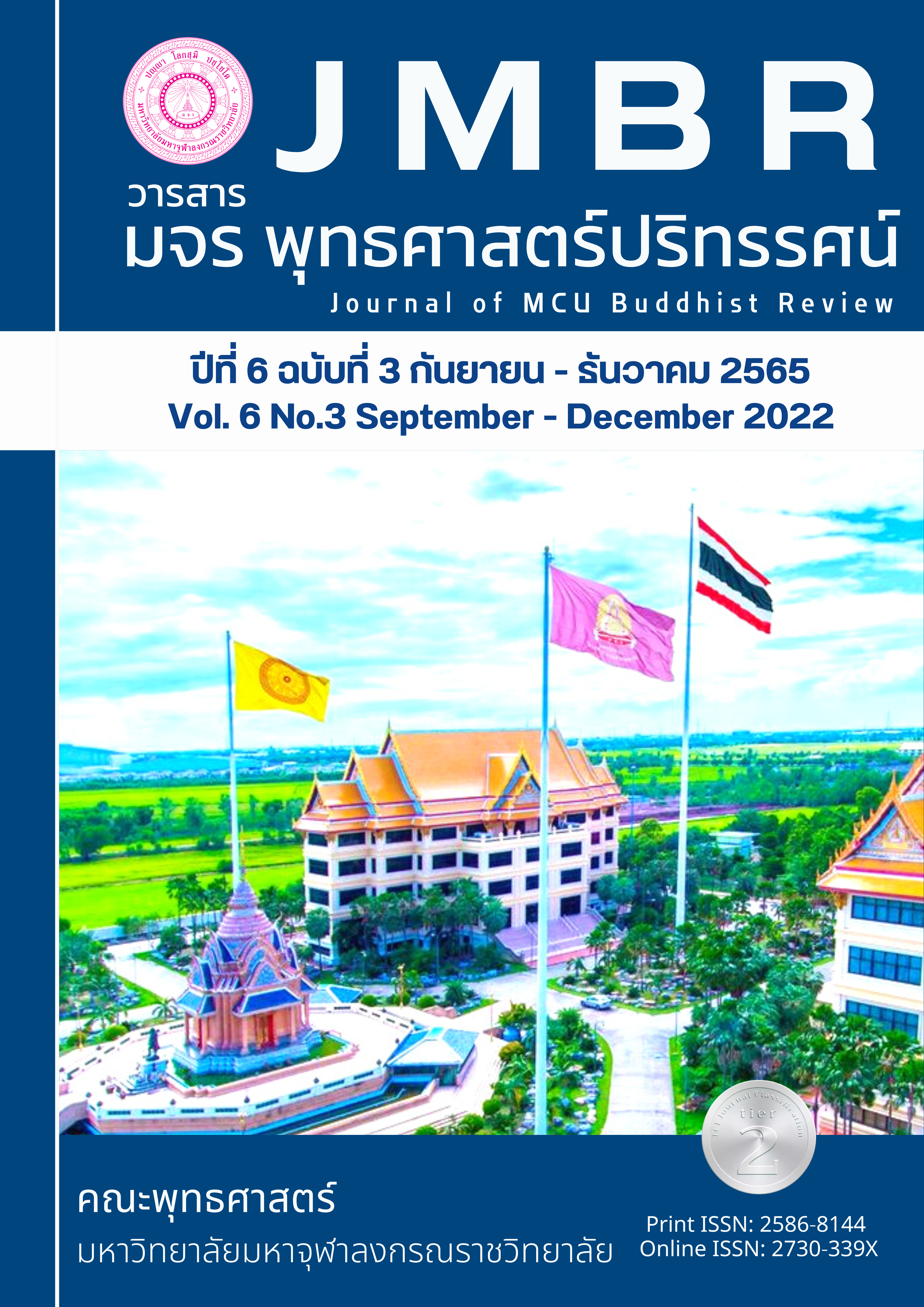เกณฑ์การวินิจฉัยการอวดอุตตริมนุสธรรมตามหลักการในพระไตรปิฎก
Main Article Content
บทคัดย่อ
บทความวิจัยนี้มีวัตถุประสงค์ (1) เพื่อศึกษาการอวดอุตตริมนุสธรรมในพระไตรปิฎก (2) เพื่อศึกษาหลักเกณฑ์การวินิจฉัยการอวดอุตตริมนุสธรรมในพระไตรปิฎก (3) เพื่อเสนอแนวทางการป้องกันการอวดอุตริมนุสสธรรมตามหลักการในพระไตรปิฎก การวิจัยนี้เป็นการวิจัยเชิงเอกสาร ผลการวิจัยพบว่า
1) การกล่าวธรรมอันยวดยิ่งของมนุษย์ ได้แก่ ฌาน วิโมกข์ สมาธิ สมาบัติ ญาณ มรรคภาวนา การทำให้แจ้ง การละกิเลส ภาวะที่จิตปลอดจากกิเลส ความยินดีในเรือนว่าง นิพพาน และความเป็นพระอริยบุคคล ด้วยคำพูดหรือการแสดงเลสให้ผู้อื่นทราบ ทั้งทางตรงและโดยอ้อม
2) การที่ภิกษุกล่าวกับผู้อื่นว่า ผมเข้าแล้ว ผมกำลังเข้าอยู่ ผมเข้าอยู่แล้ว ผมมีปกติได้ ผมมีปกติชำนาญ ผมทำให้แจ้งแล้ว ซึ่งอาการเหล่านี้ เป็นการอวดอุตตริมนุสธรรมทุกข้อและถ้าผู้ฟังนั้นเชื่อและเข้าใจ ภิกษุผู้นั้นต้องอาบัติปาราชิก
3) แนวทางการแก้ไขปัญหาและป้องกันการอวดอุตตริมนุสธรรมในพระไตรปิฎก มีแนวทาง 6 ประการ คือ ต้องเกิดความละอายใจ 1 ต้องรู้สิ่งที่จะเป็นอาบัติ 1 ต้องไม่สงสัยแล้วขืนทำ 1 ต้องไม่สำคัญว่าควรในของที่ไม่ควร 1 ต้องไม่สำคัญว่าไม่ควรในของที่ควร 1 และต้องมีสติไม่หลงลืมสติ 1 ส่วนแนวทางในการป้องกันการอวดอุตตริมนุสธรรมของพระสงฆ์ในสังคมไทยปัจจุบัน
มีแนวทางการป้องกัน คือ (1) แนวทางระดับบุคคล คือผู้ต้องอาบัติต้องรับผิดต่อการกระทำนั้น (2) ระดับองค์กร คณะสงฆ์ต้องมีบทบัญญัติว่าด้วยบทลงโทษผู้กระทำความผิดตามพระธรรมวิจัย และการกล่าวตักเตือนชี้แจงกฎเกณฑ์ในการประพฤติปฏิบัติที่ถูกต้องเหมาะสม (3) ระดับนโยบาย โดยมีนโยบายทั้งในระดับรัฐและระดับองค์กรสงฆ์ในการกำกับดูแลอีกทั้งยังวางกฎเกณฑ์ระเบียบข้อบังคับต่าง ๆ ให้สอดคล้องกันเพื่อความชัดเจนในทางปฏิบัติ
Article Details

อนุญาตภายใต้เงื่อนไข Creative Commons Attribution-NonCommercial-NoDerivatives 4.0 International License.
- บทความที่ได้รับการตีพิมพ์เป็นลิขสิทธิ์ของวารสาร มจร พุทธศาสตร์ปริทรรศน์
- ข้อความใดๆ ที่ปรากฎในบทความที่ได้รับการตีพิมพ์ในวารสาร ถือเป็นความรับผิดชอบของผู้เขียนบทความ และข้อคิดเห็นนั้นไม่ถือว่าเป็นทัศนะและความรับผิดชอบของกองบรรณาธิการวารสาร มจร พุทธศาสตร์ปริทรรศน์
เอกสารอ้างอิง
นฤมล มารคแมน. “อิทธิปาฏิหาริย์ในพระพุทธเจ้า”. วารสารรามคำแหง ฉบับมนุษยศาสตร์. ปีที่ 36 ฉบับที่ 2 (กรกฏาคม-ธันวาคม 2560): 157-171.
บรรจบ บรรณุจิ. (2558). วิเคราะห์ปาราชิก 4 เพื่อการเรียนการสอน. รายงานวิจัย. ได้รับทุนอุดหนุนการวิจัยจากมหาวิทยาลัยมหาจุฬาลงกรณราชวิทยาลัย. สถาบันวิจัยพุทธศาสตร์ : มหาวิทยาลัยมหาจุฬาลงกรณราชวิทยาลัย.
มหาจุฬาลงกรณราชวิทยาลัย. (2535). พระไตรปิฎกภาษาไทย ฉบับมหาจุฬาลงกรณราชวิทยาลัย. กรุงเทพมหานคร: โรงพิมพ์มหาจุฬาลงกรณราชวิทยาลัย.
สมเด็จพระพุทธโฆษาจารย์ (ป.อ. ปยุตฺโต). (2559). พจนานุกรมพุทธศาสน์ ฉบับประมวลศัพท์. พิมพ์ครั้งที่ 30. กรุงเทพมหานคร: สำนักพิมพ์ผลิธัมม์ ในเครือ สำนักพิมพ์เพ็ทแอนด์โฮม จำกัด.
มานพ บุญชื่น. (2561). “การศึกษาวิเคราะห์การอวดอุตตริมนุสสธรรมในคัมภีร์พระพุทธศาสนาเถรวาท”. วิทยานิพนธ์พุทธศาสตรมหาบัณฑิต สาขาวิชาพระไตรปิฎกศึกษา. บัณฑิตวิทยาลัย: มหาวิทยาลัยมหาจุฬาลงกรณราชวิทยาลัย.
อธิเทพ ผาทา. (2549). “การศึกษารูปแบบกระบวนการแก้ปัญหาในพระพุทธศาสนาเถรวาท:ศึกษาเฉพาะกรณีอธิกรณสมถะ 7 และกฎนิคคหกรรมของมหาเถรสมาคม ในพระราชบัญญัติคณะสงฆ์ พ.ศ. 2505 แก้ไขเพิ่มเติม (ฉบับที่ 2 ) พ.ศ. 2535”. วิทยานิพนธ์พุทธศาสตรมหาบัณฑิต สาขาวิชาพระพุทธศาสนา. บัณฑิตวิทยาลัย: มหาวิทยาลัยมหาจุฬาลงกรณราชวิทยาลัย.


